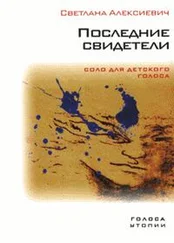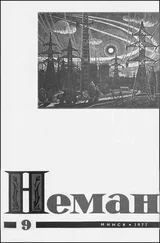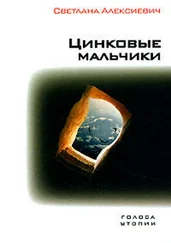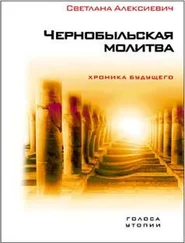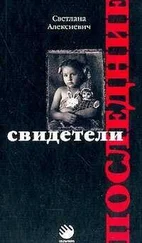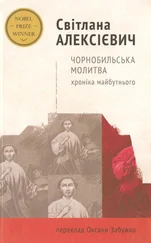Светлана Алексиевич - Chernobyl Prayer - A Chronicle of the Future
Здесь есть возможность читать онлайн «Светлана Алексиевич - Chernobyl Prayer - A Chronicle of the Future» весь текст электронной книги совершенно бесплатно (целиком полную версию без сокращений). В некоторых случаях можно слушать аудио, скачать через торрент в формате fb2 и присутствует краткое содержание. Год выпуска: 2016, ISBN: 2016, Издательство: Penguin Books Ltd, Жанр: Биографии и Мемуары, на английском языке. Описание произведения, (предисловие) а так же отзывы посетителей доступны на портале библиотеки ЛибКат.
- Название:Chernobyl Prayer: A Chronicle of the Future
- Автор:
- Издательство:Penguin Books Ltd
- Жанр:
- Год:2016
- ISBN:9780241270547
- Рейтинг книги:3 / 5. Голосов: 1
-
Избранное:Добавить в избранное
- Отзывы:
-
Ваша оценка:
- 60
- 1
- 2
- 3
- 4
- 5
Chernobyl Prayer: A Chronicle of the Future: краткое содержание, описание и аннотация
Предлагаем к чтению аннотацию, описание, краткое содержание или предисловие (зависит от того, что написал сам автор книги «Chernobyl Prayer: A Chronicle of the Future»). Если вы не нашли необходимую информацию о книге — напишите в комментариях, мы постараемся отыскать её.
Chernobyl Prayer: A Chronicle of the Future — читать онлайн бесплатно полную книгу (весь текст) целиком
Ниже представлен текст книги, разбитый по страницам. Система сохранения места последней прочитанной страницы, позволяет с удобством читать онлайн бесплатно книгу «Chernobyl Prayer: A Chronicle of the Future», без необходимости каждый раз заново искать на чём Вы остановились. Поставьте закладку, и сможете в любой момент перейти на страницу, на которой закончили чтение.
Интервал:
Закладка:
For the funeral, I covered his face with two handkerchiefs. If anyone asked to see him, I drew them back. One woman collapsed … She had once loved him and I was jealous of her. ‘Let me see him one last time.’ ‘Go ahead.’
I didn’t tell you that, when he died, no one could bring themselves to go near him. They were all afraid. And family members can’t lay out a body themselves. It’s our Slavic tradition. They brought two male nurses from the mortuary. They asked for vodka: ‘We thought we’d seen it all,’ they admitted, ‘mangled corpses, knifed, bodies of children after a fire, but we’ve never seen anything like this …’ ( She quietens down .) He died and lay there, so hot you couldn’t touch him. I stopped all the clocks in the house … It was seven in the morning … our clocks are all stopped to this day, you can’t restart them … The clock repairer came. He just shrugged and said, ‘It’s not mechanical, not physics. It’s metaphysics.’
Those first days, without him … I slept for two days. No one could wake me. I would get up, have a drink of water, not even eat, and then fall back on the pillow again. It seems strange to me now that I could sleep like that. When my friend’s husband was dying, he threw plates at her. He cried. He wanted to know why she was so young and beautiful. My husband just gazed and gazed at me. He wrote in our notebook, ‘When I die, have my remains cremated. I don’t want you to be frightened.’ Why did he make that decision? Well, there were various rumours around: even after death, Chernobyl victims were said to glow … At night, a light would appear above their graves. I had read myself that people gave a wide berth to the graves of the Chernobyl firemen who had died in Moscow hospitals and been buried nearby in Mitino. Local people wouldn’t bury their own dead alongside them. The dead afraid of the dead … to say nothing of the living. Because nobody yet understands Chernobyl. It’s all speculation, dread. He brought his white work clothes back from Chernobyl. Trousers, boiler suit. They were in our top cupboard until he died. Then my mother decided, ‘We need to throw out all his belongings.’ She was frightened, but I kept even his boiler suit. ‘You’re a criminal! You have young children in the house. A son and daughter.’ We took them outside the city and buried them. I’ve read a lot of books, I live among them, but they don’t explain anything. They brought us the urn. I wasn’t afraid of it. I touched the ashes and found something small in there, like seashells on the beach, in the sand. It was fragments of hip bone. Until then, when I touched his things, I hadn’t felt, hadn’t sensed anything, but then it was as if I had put my arms round him. During the night, I remember, he was dead and I was sitting beside him. Suddenly, there was a haze. I saw it above him a second time at the crematorium … His soul … No one else saw it, only me. I felt we had seen each other once more …
Oh, how happy I was, how happy! If he had to go away for his work, I counted the days and hours, the seconds, until we would be together again! I physically can’t do without him, I just can’t! ( Covers her face with her hands .) I remember we went to visit his sister in the countryside. In the evening, she said, ‘I’ve made up this room for you, and that room for him.’ We looked at each other and burst out laughing. It had never occurred to us that we could sleep apart, in different rooms. We had to be together. I can’t live without him. I can’t! I’ve had plenty of offers, including from his brother. They’re so similar, in height, even the way they walk. But it seems to me that, if anyone else were to touch me, I would just cry and cry and never stop.
Who took him away from me? What right did they have? They handed him a call-up notice with a red stripe, dated 19 October 1986 … ( She brings a photograph album and shows wedding pictures. When I want to say goodbye, she stops me. )
How can I go on living? I haven’t told you everything, not all of it. I was happy, madly happy. There are secrets … perhaps you shouldn’t include my name … People say their prayers in private. To themselves … ( Trails off .) No, put my name! It will be a reminder to God … I want to know, I want to understand why we should have to bear this sort of suffering? What’s it for? At first, it seemed that after everything that had happened something dark would appear in my eyes, something alien. I wouldn’t be able to endure it. What saved me? What forced me back towards life? Brought me back? My son. I have another son … The first boy I had with him. He’s been ill for a long time. He’s grown up now, but sees the world through the eyes of a child, the eyes of a five-year-old. I want to be with him now. I hope to exchange my apartment for one closer to Novinki, the mental hospital there, where he’s lived all his life. That was the verdict of the doctors: for him to live, he needed to be there. I go every day. When he sees me, he asks, ‘Where is Daddy Misha? When will he come?’ Who else could ask me that? He’s waiting for him.
We will wait for him together. I will say my Chernobyl prayer, and he will look at the world with the eyes of a child …
Valentina Timofeyevna Apanasevich, wife of a clean-up worker
In place of an epilogue
From materials published in Belarusian newspapers in 2005
… Kiev travel agency offers tourist trips to Chernobyl …
We have arranged an itinerary, starting in the ghost city of Pripyat. You will visit abandoned multi-storey apartment blocks with blackened laundry on their balconies and children’s prams. The former police station, hospital and the Municipal Communist Party Committee building. The slogans of the Communist era are still there: not even radiation can obliterate them.
From Pripyat, our route takes us to ghost villages where wolves and wild boar scavenge through the cottages in broad daylight. They have been proliferating, monstrously!
The culmination of the trip or, as they say in the brochure, the ‘highlight’, is a viewing of the Shelter Reactor, more commonly known as the ‘Sarcophagus’. Hastily constructed over the destroyed Reactor No. 4, it has long been covered in cracks through which its deadly contents emit background radiation from what remains of the nuclear fuel. You are certainly going to have something to tell your friends about when you get back home. This is not just some excursion to the Canary Islands or Miami …
Your trip concludes with souvenir photographs at the stele in memory of the fallen heroes of Chernobyl, to give you a sense of your involvement in history.
After the excursion, lovers of extreme tourism are invited to enjoy a picnic lunch of ecologically safe food, washed down with red wine. And Russian vodka. You are assured that, during your day spent in the exclusion zone, you will be subjected to a dose of radiation less than that involved in a standard medical X-ray check-up. You are, however, advised not to bathe, or eat any fish you have caught or game you have shot. Neither should you pick berries or mushrooms, or roast them on a campfire. You should also not give ladies bunches of wild flowers.
Do you think I am out of my mind? You would be mistaken: atomic tourism is in great demand, especially among Westerners. People crave strong new sensations, and these are in short supply in a world so much explored and readily accessible. Life gets boring, and people want a frisson of something eternal …
Visit the atomic Mecca. Affordable prices.

THE BEGINNING
Читать дальшеИнтервал:
Закладка:
Похожие книги на «Chernobyl Prayer: A Chronicle of the Future»
Представляем Вашему вниманию похожие книги на «Chernobyl Prayer: A Chronicle of the Future» списком для выбора. Мы отобрали схожую по названию и смыслу литературу в надежде предоставить читателям больше вариантов отыскать новые, интересные, ещё непрочитанные произведения.
Обсуждение, отзывы о книге «Chernobyl Prayer: A Chronicle of the Future» и просто собственные мнения читателей. Оставьте ваши комментарии, напишите, что Вы думаете о произведении, его смысле или главных героях. Укажите что конкретно понравилось, а что нет, и почему Вы так считаете.

